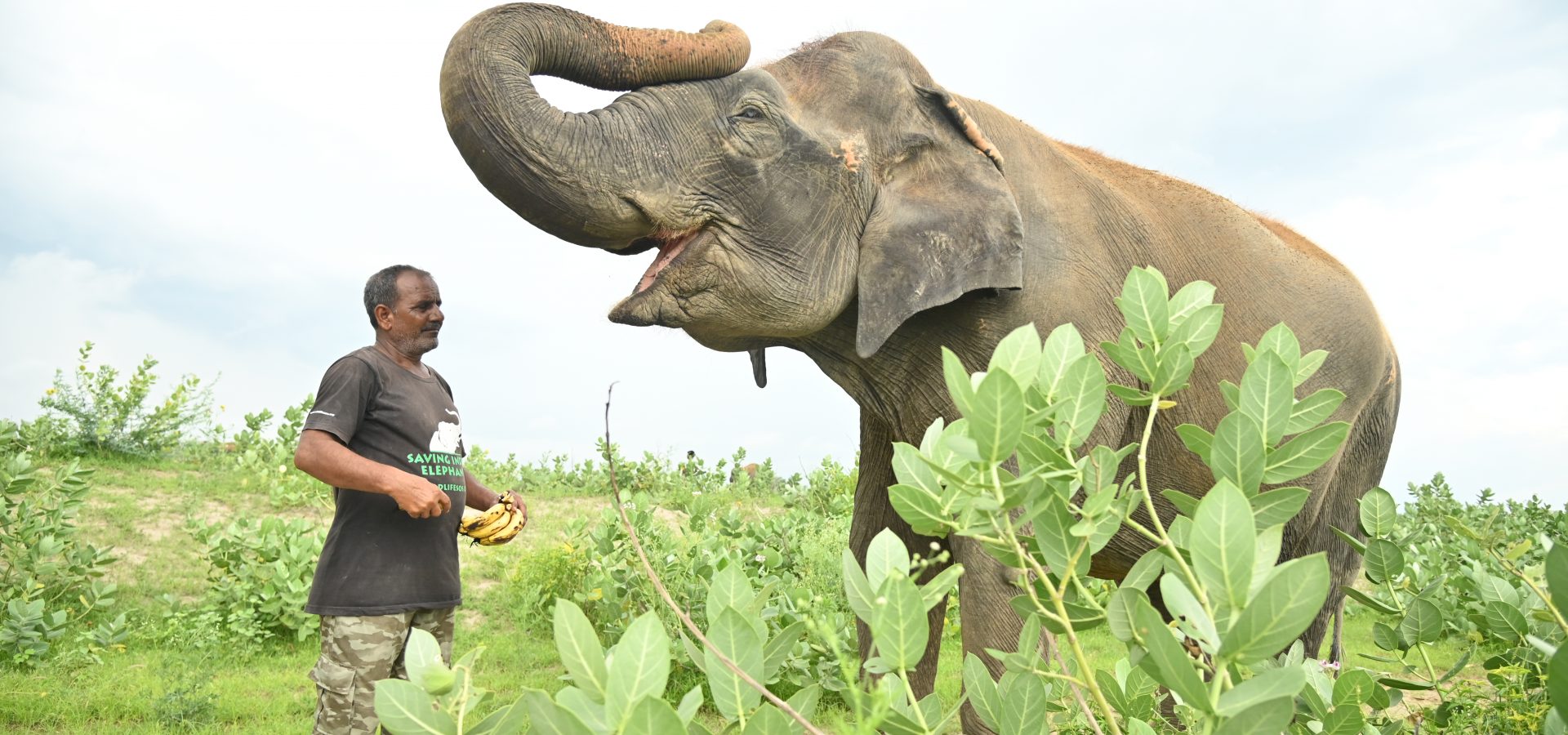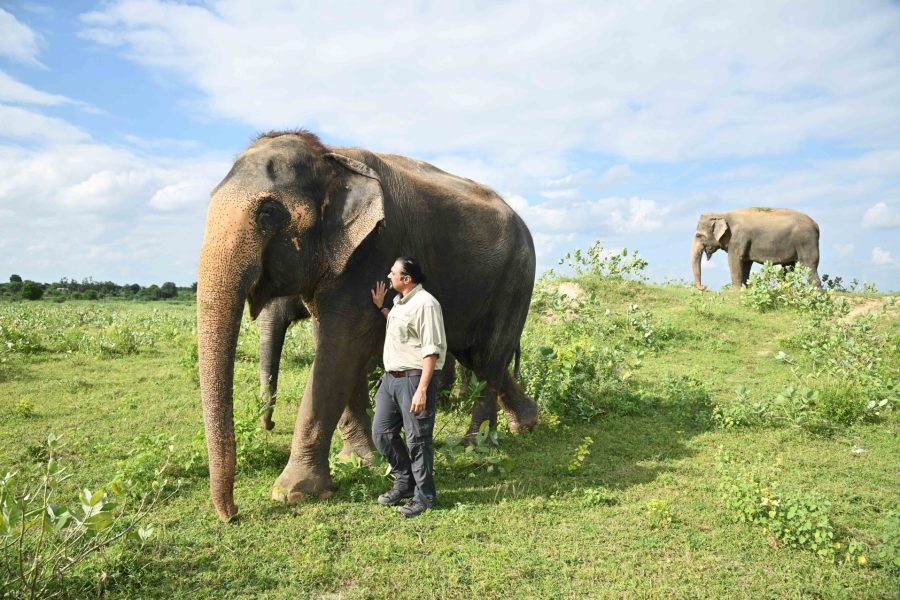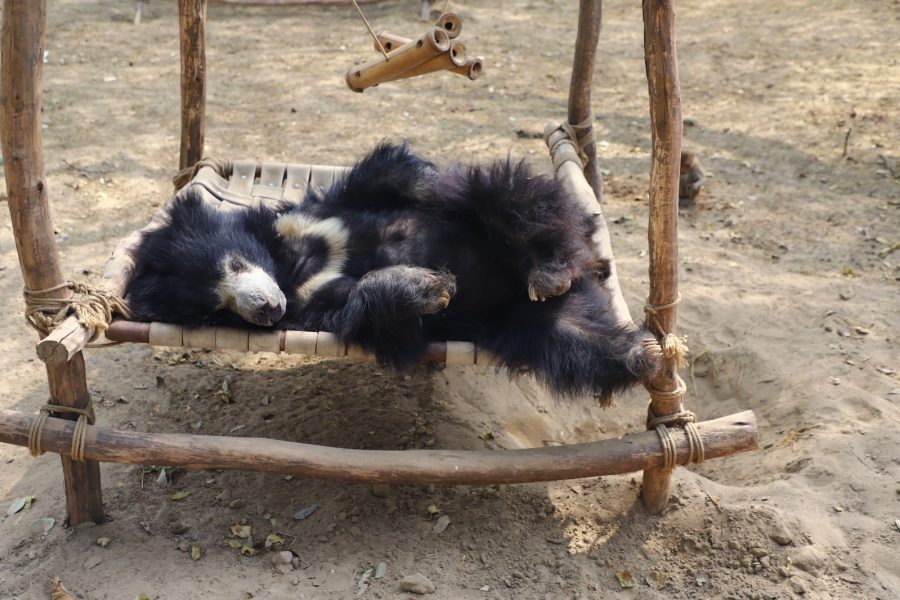Nestled within the beautiful lands of Elephant Conservation and Care Centre (ECCC) and Elephant Hospital Campus (EHC) in Uttar Pradesh are the majestic animals that roam in their vast fields. Meet the gentle giants, whose daily routines are carefully designed with love and care to ensure their physical and mental well-being. Having been rescued from challenging circumstances in the past, they continue their journey of healing at Wildlife SOS. Let’s walk you through a regular day spent with the elephants at our centres, and the meticulous care provided by the caregivers.
Early to Bed, Early to Rise!
Elephants are known to be early risers. In the wild, they sleep mostly for 2 hours, but here at our centres, they get to sleep comfortably for 3-4 hours. The caregivers also wake up early to refill the fresh drinking water and clean their enclosure overall. This includes cleaning of the water trench, pool, and removing dung and leftover fodder from the previous day. A few early mornings are filled with loud snores by Mia, while some elephants like young Walnut are wide awake and await their caregiver. Few others like Suzy continue to sleep and wake up only when their caregiver gently pats them.
[Photo © Wildlife SOS/Mradul Pathak]
Morning Begins Early with a Walk
The morning walks of our resident elephants begin at around 6 am every morning. Our elephants are always accompanied by their caregivers, who also make sure to carry some favourite treats for the elephants to munch on. This nourishing ritual sets a positive tone for the day. Delicious seasonal fruits including cucumbers, watermelons, and pumpkins are offered to our elephants during their walks. However, Suzy, being under geriatric care, gets her share of mashed papayas and ripened bananas just before she begins her walk. Softened fruit helps her as she no longer has her molar teeth.
Their walk lasts for about 3 hours, during which they cover a minimum distance of about 8 km. The timing of their walks varies according to the season. In summers, for instance, the elephants return from their walks by around 8.30 am to avoid excessive heat, while in winters, they set out for their daily walk between 7 am and 7.30 am due to the fog.
One of our resident elephants, Phoolkali, is accompanied by her closest companion Maya when their caregivers take them for her daily walks. This has strengthened the bond of warmth and compassion that the two pachyderms share with each other.
Once in a while, our team also looks into the elephants’ dung excretion. To chart out a wholesome diet plan for them, each elephant’s dung is weighed to monitor how much food was consumed and assess their overall metabolism. This critical information helps the caregivers and doctors adjust their diet and ensure that they receive appropriate nutrients to sustain and improve their health daily. The body weight of elephants is also diligently recorded to track their well-being over time.
Target Training Session with Treats!
After they return from the morning walk, the elephants take rest, allowing their caregivers to partake in their own breakfast. Once rested, the elephants engage in target training sessions conducted by the staff. These sessions work on the principle of positive reinforcement. Elephants are rewarded with edible treats every time they perform a required action. In each elephant field, a Protected Contact (PC) wall is installed to facilitate medical treatment or examinations. This specially designed wall encourages secure interactions between the elephants and their caregivers or veterinarians. The elephant uses the opening of the wall to place its ear or limbs to facilitate drawing of blood. The elephants are gently prompted to flap their ears, open their mouth or lift their leg without any verbal command. Their mouth is checked for any signs of ulcers, and the molars are examined to ensure they are in good condition. The ears, primarily used for blood collection, are also closely monitored for any signs of concern. These daily checks contribute to early detection and timely treatment of any health issues.
A Refreshing Bath
One of the most eagerly awaited moments for elephants in their daily routine at Wildlife SOS is their bathing time! This happens at around 11 am, right after the elephants have completed their target training. Caregivers arrive with hose pipes to shower them with water, and scrub their entire body and feet with utmost care and love.
Midday Feeding and Engaging with Enrichments
At around 1 pm, the caregivers take turns for their own lunch break after making sure that one of them is always present to watch out for the elephants. During this time, the elephants are provided with fresh and juicy fruits that they relish.
Food-based enrichments, such as cage feeders and hanging fodder, are set up to keep the elephants engaged in the day. These enrichment items challenge the elephants’ problem-solving skills and help them to hone their natural foraging behaviour.
The concentrated meals provided to elephants are checked by the veterinarians, who chart out a plan tailored to suit every elephant’s individual needs. The food prepared by the staff consists of properly measured and cut ingredients. Every ingredient elephants consume is of high quality. Essential medications and multivitamins are added to their daily diet to support their overall health.
Evening Walks and Pool Time!
Early in the evening between 4 and 5 pm, the elephants set off for another energised walk. While they are away, their enclosure is cleaned, and all enrichments are refilled for the elephants to snack on when they return.
Grooming plays a crucial role in the elephant’s daily care. Foot grooming of elephants ensures that their nails are of an appropriate shape and length, preventing overgrowth and any discomfort while walking. After walks, the elephants’ feet are carefully checked for any injuries. Nail cuticle grooming is also a routine procedure to maintain their nails and feet.
After some rest, on some days our staff resumes with the second target training session of the day. Elephants indulge in tasty treats provided during this positive conditioning session as well. In the evenings, especially during summers, the elephants enjoy cooling dust baths along with water baths in their pool that is refilled with fresh water daily. Pool time is exciting for elephants as they get to splash and sprinkle water all over and around themselves!
Dinner and a Good Night’s Sleep
At around 8.30 pm, the elephants receive their nighttime food that has necessary nutrients. Their sleep is carefully monitored with CCTV surveillance and under the watch of dedicated guards. The guards take rounds of the facility and record each elephant’s sleep schedule to check if they have slept well through the night. The caregivers leave to sleep on time as they have to wake up early the next morning to provide the same care. Meanwhile, the elephants relax on their mud beds, and fall asleep by 12 am.
The daily routine of the elephants at Wildlife SOS also displays the compassion of their caregivers. From monitoring their metabolism and body weight to engaging in enriching activities, grooming, medical checkups, and target training, each element is thoughtfully designed to suit every elephant’s needs. The bond between the elephants and their caregivers is strong due to the trust and the affection shared between them. You too can contribute towards the care of our rescued pachyderms by making a donation here.





